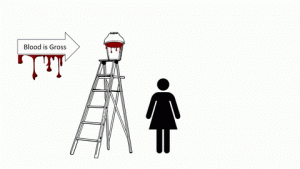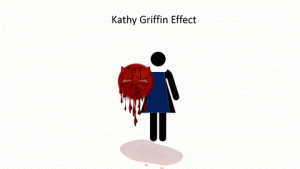Regardless of how one feels about Cassie Jaye’s movie about men’s rights activists, “The Red Pill,” there’s no disputing the documentary has received widely varied reactions from different audiences. These vary from intensely supportive to overtly hostile.
In a series of articles, we’ll explore the visceral reaction some people have to the topic of men’s human rights and explore how some people are inclined to believe men and boys are a subspecies.
To better understand this, we’ll explore the science of grossness, parasite and pathogen stress, some attributes of human mate selection, human in-group and out-group dynamics, including the Just-world hypothesis and System Justification Theory, grossness as a measure of human value, and the phenomena of human derogation during an era of proliferation of social technologies.
In order to fully explore grossness in the human experience and men’s role as homogeneous human subspecies, we’ll also discuss men’s apparent inability to automatically recognize other men as humans.
Warning:
These articles cover topics such as poop, shit, blood, brains, foreskins, piss, ball sacks, boogers, implicit and explicit bias, and automatic human in-group/out-group behavior. These are of the grossest topics human beings can conceive, and some may need to take extra care, particularly women and conservatives.
Women and conservatives both report experiencing greater disgust sensitivity than their counterparts. Looking at human social dynamics through the lens of disgust (parasite and pathogen stress) is disturbing and might reveal a darker view into the experience of humanity as a whole.
While disgust is a deeply ingrained, useful, emotional response that has served our species very well, some of the darkest, most tragic, historical events have been directly linked to it. While disgusting things have always been a problem for our species, it seems the stresses created by disgust may be even more dangerous. Grossness is an emotional response and can supersede logic and subvert reason.
Increased parasite stress leads to greater maltreatment of children, violence, murder, and the rise of totalitarian regimes, both left and right. Disgust is inextricably woven into of our social and political fabric. Grossness is used to describe and evaluate humans, human bodies, and human behavior, as well, to demonstrate group status.
Appearing grossed out by the “right” things can improve ingroup standing. Logic, reason and ethics can all be overridden when disgust sensitivity is exploited. In the last century, this may have led to more and bloodier violence, and related deaths, than any other known period. Exploiting disgust sensitivity via disgust derogation is dangerous but the rewards can be great for despots.
Between 1914-1918, 70 million people were exposed to unparalleled gore and violence. World War I caused over 16 million deaths. Some survivors came home carrying the 1918 Flu which was responsible for more deaths than the war itself; Between 20 and 50 million by most estimates.
It should be noted, these were particularly gruesome deaths, of mostly robust, healthy children and young adults causing unparalleled societal stress. An argument could be made that the world was “grossed into” World War II.
In Alvin Toffler’s 1970 book, “Future Shock” he explores technology stress and the concept of “too much change in too short a period of time”. The rise of interconnected, inter-networked, pervasive technologies seems to have correlated directly with the rise to record high stress levels.
The story of humans, interwoven with parasites, pathogens, their carriers, and related stress, is an unusually unpleasant tale and is difficult and often too socially taboo to discuss.
Be forewarned, these articles are NSFW. There will be foul language, grossness, and disgusting human behavior, mixed with mild attempts at humor. I will try and keep it as inoffensive as possible because its message may be vitally important. Understanding why some percentage of people are incapable of or unwilling to see men as human beings, may just stop us from racing toward a global catastrophe.
You have been warned.
Why are Some People Squeamish or Angry about Men as a Human Rights Demographic?
The suggestion that men are humans, while seemingly logical on the surface, may make some people indignant, uncomfortable, or literally disgusted. Others, by contrast, might take active offense immediately and intuitively. If you are one of those, this article is for you.
This paper explores the underlying biologic and sociological impulses explaining why some people have this visceral, gut level reaction; some frightening implications, and perhaps, some hope that a few good women will eventually save the day.
First Exploration of a Theory of Universal human Grossness
Humans are gross. We emerge from sacks of placenta, end up as corpses, and in between, we, fart, poop, pee, pick our noses, and vomit. Sometimes all at the same time. Sometimes on ourselves, sometimes on others. We’re not always able to de-gross ourselves to our own satisfaction, let alone to the satisfaction of others. Men, women, boys and girls all exhibit grossness. We all experience it.
Both biologic and behavioral traits can be measured in grossness. Many gross words describe behaviors and people (i.e. being a shit, acting shitty, slimebag, greaseball, or being an asshole) This is the functional language of social grossness. Grossness is often used to derogate out-groups.
Disgust derogation is a conflation process where people become gross, either through contact with actual pathogens and parasites, their carriers, or through association by exhibiting contrary behaviors or beliefs, as defined by the in-group. Grossness can also be transferred through accusations.
Humans often retaliate when grossness is thrust upon them. People hate being labeled as gross, or conflated with grossness. It stirs exaggerated, often violent, escalated reactions. Stress, in the US has been rising for 40 years during which time there have been increases in human derogation via increased prison populations and homelessness.

Social grossness was explored to great effect in Stephen King’s first novel, “Carrie”. In the 1977 movie adaptation, Vinnie Barbarino’s in-group conspires to dump pig’s blood, a parasite and pathogen carrier, onto a Coal Miner’s Daughter. Her response to the derogation is to use the Force to mutilate and burn everyone involved, except the heroic girl who was brave enough to speak up against the group.
People also resent the implication that they, or their in-group, may be susceptible to the abuse of disgust propaganda or derogation. Whether the abuse is biologic grossness (boogers, poop, etc.) or attitude, behavior, or belief grossness.
People often exhibit an escalated response to being called Racist, Sexist, Anti-Semitic. These are among modern societies most damning insults, right after pedophile or murderer, and it’s akin to being accused of being perennially and viciously stupid.
This may be in part, because racists, sexists, and anti-semites have historically been incited by disgust derogation which has been linked to violent or asocial behavior. The implication that someone is a racist, sexist, or Anti-Semite implies that person possesses a certain, dangerous gullibility.
When in-groups engage in out-group disgust derogation, they are exploiting parasite or pathogen stress to demonstrate the superiority of their group’s social position, while lowering the out-group’s relative humanity. Subhumans are not seen as individuals, but as stereotypes of the out-group.
Resistance to the Abuse of Disgust Propaganda
The potential spread of pathogens and parasites is serious business. Humans find it deeply disturbing to discover disgust derogation being used to increase in-group favoritism or promote out-group derogation, especially when it invariably goes beyond acceptable parameters.
For many reasons, human beings resent being manipulated by disgust, and become enraged when people are discovered using disgust derogation to harm members of an out-group.
The Kathy Griffin Effect
If a group were looking to convert or motivate women or conservatives using disgust derogation they might want to think twice.
Abusers of disgust derogation can unwittingly create sympathy for the out-group when the abuse of derogation is discovered. The in-group loses reputation, and are sometimes shamed out of existence.

No two examples illustrate this more clearly than Nazi propaganda, which framed Jews as both vermin and lice, and American anti-black propaganda, which framed black men as rapists, inherently inferior, or willing to harm women, or harm children or neglect the needs of children. These people are pissed about this and have every right to be.
Attributing these behaviors to men of any subgroup is a powerful manipulation, as these are universally understood to be undesirable mate selection traits. This links that group’s stereotype directly to parasites and pathogens. Men who are unacceptable are gross and subhuman.
Within certain boundaries, the abuse of parasite stress in propaganda is extremely effective, in-group members can believe, at a gut level, that the out-group are all the same, and that they deserve whatever they get, because, generally speaking, they’re to blame for their own misfortune. In-groups are subject to nearly every social bias against out-group members.
Disgust derogation conflates disease, disease carrying agents, or behaviors that the in-group finds disgusting and dumps them on the out-group. The out-group is then subject to dehumanization and derogation. As mentioned, people are offended at the mere suggestion, that they themselves could be influenced or persuaded by such obvious manipulation.
While this type of propaganda is effective in encouraging out-group derogation or removal, it also boosts in-group esteem. Although it does appear to become counter-effectual when we witness levels of out-group abuse getting out of control, or breaching accepted boundaries.
The Nazi brand is forever associated with the Auschwitz/Dachau documentary footage; footage so disgusting, it was ultimately abandoned by director Alfred Hitchcock.
American anti-black racism is linked in our collective imagination with images of Emmett Till.
Nearly all of us felt revulsion when anti-white, anti-Trump bigotry manifested in violence in the 2017 kidnap and torture of a young autistic man, exposed to violence, humiliation, and possibly parasites/pathogens. Similarly. we all felt uncomfortable with the recent shooting of Congressman Scalise.
These tragedies entered the public consciousness and will not likely leave it soon. Similarly, if you are less outraged by either of these, you may be one of the 85-100% of people who may not recognize men as human beings.
We may not be equally disgusted by these things, of course; but we are trained against the beliefs, movement, or group that manipulated us, or others, in such a way as to corrupt acceptable boundaries for the treatment of others. Disgust is inherently about the violation of boundaries and the protections those boundaries afford.
Spreading parasite stress among the tribe, via social exchanges, facial expressions, body language or propaganda, has been a very effective way to elicit social change, but it appears it may even be more disastrous than spreading actual parasites.
Child Maltreatment, Murder, and the rise of Authoritarian Governments have all been linked to an increase in parasite stress. Spreading of parasite stress to advance a political agenda is a dangerous practice which we should should no longer tolerate. It will come back to bite any group, or ideology that uses it.
In the next article, we’ll make a Weak Case for the Humanity of Men. Stay Tuned.
To read all of the articles in this series:
Article #1 – Otto Warmbier, Philando Castile and the Outgroup Derogation of Men
Article #2 – Grossness as a Human Value Indicator
Article #3 – A Weak Case for the Humanity of Men
Article #4 – Oh Fuck; We’re Doomed and Only Women Can Save the Day
Article #5 – Philando Castile, Justine Damond, and the In-Group Bias Toward Woman
